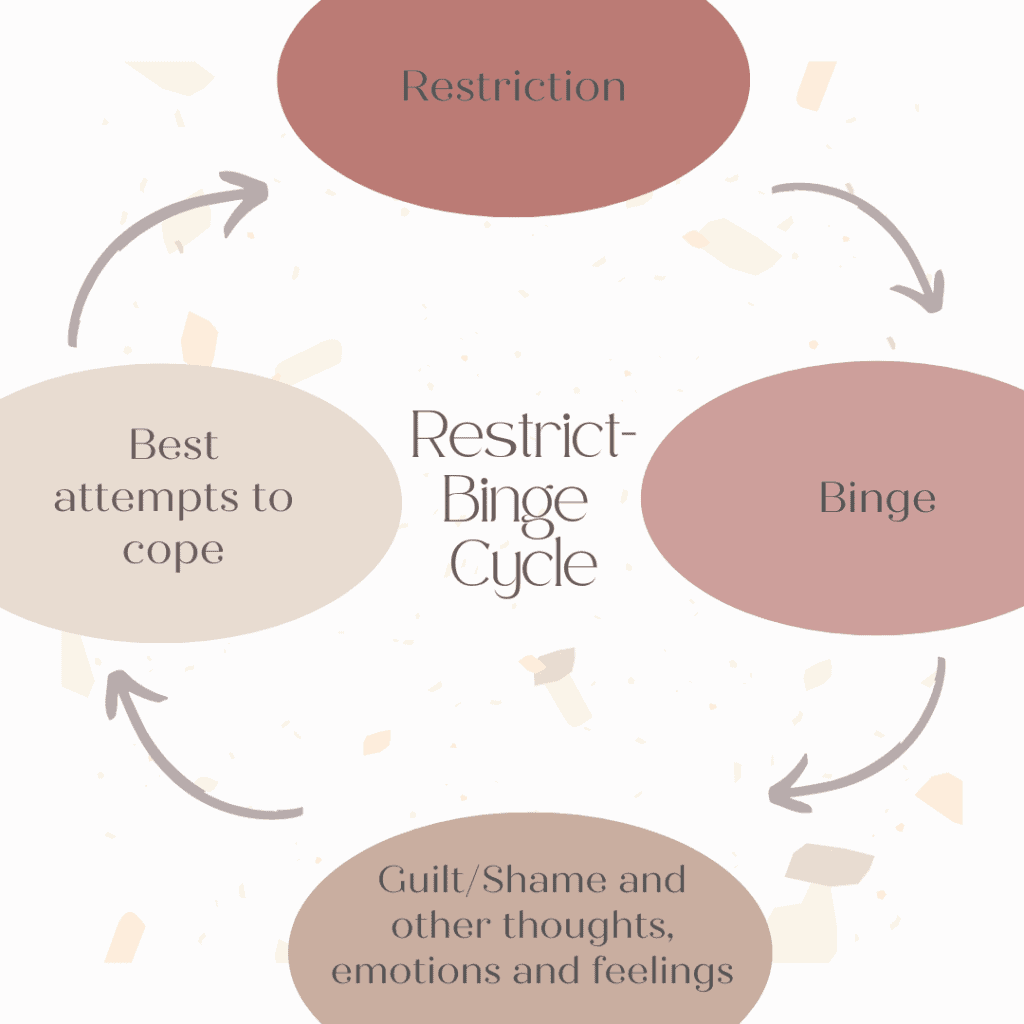The Restrict-Binge Cycle: 3 Things that Keep you Stuck in it
Binge eating conversations often focus on the binge eating episodes themselves but without zooming out to consider the role restriction plays for many experiencing binge eating (but not all) one of the key pieces of the puzzle can be left missing. You may be stuck in the restrict-binge cycle.
What is the restrict-binge cycle?
Diet culture would name restriction as “good” or “desirable” while labelling a binge as “bad” or what needs fixing. Restriction however, is often a key part of what keeps binge eating going and thus keeping people stuck in a restrict-binge cycle. How long someone spends in each part of the cycle shown below can vary. Zooming out and compassionately considering the role both restriction and binges may be playing can help make more sense of your own experience.This can work to create space in which you can explore new tools and skills to support you in moving forward differently.
The Restrict-Binge Cycle

3 Things that Keep you Stuck in the Restrict-Binge Cycle:
1) Not eating enough during the day.
- If your body has not received regular and adequate nutrition during the day then it has unmet needs for nutrients and energy in food. By the time the afternoon or evening arrives (a very common time for people to experience episodes of binge eating, but certainly not the only way binge eating episodes show up) that need has grown and intensified. Wondering why you are still hungry or how you could still be hungry? Always hungry? Never hungry? These are important things to tune into and get more curious about.
- Rules about when, what, how much to eat, often in an effort to control food, eating and body shape and size, feed into this mismatch of what the body wants and needs during any given day in comparison to what is being provided. Your body cannot sense that you may very well live in circumstances where food is plentiful and abundant. It does, however, sense when it is not getting enough food to meet its needs, and responds accordingly to try and get its needs (your true needs) met in a variety of wise ways. The amount of food you think or believe you should have, should want or need, may not be what your body truly wants and needs.

2) Searching for a new diet or restricting types of foods or food groups in response to binge eating. Making plans to be “good” again.
- This often seems like the solution to the problem of binge eating. Diet culture certainly shouts it from the rooftop every day and it’s quite likely a health care provider, family member or friend has suggested one to you at some point. Dieting, by any name, is unfortunately perceived as a socially acceptable way to be with food and eating. This makes it then appear like it should be a workable solution. For many dieting or restriction may even be a way to try and seek safety or reprieve. This may be particularly true for those living in larger bodies. Pursuing the socially accepted behaviors of dieting may be a way to try and avoid commentary and judgement from others about food, eating and body.
- You may be seeking to find some sense of control for something that feels very much out of control in searching for a new diet or restricting in some way, shape or form. Dieting is all about pushing control and willpower as the solution to your food, eating and body concerns and offers endless flavors to choose from for how to pursue this. This pursuit, unfortunately, makes things worse in the long run. Dieting in whatever name or form it takes (“eating clean”, “getting on track”, “re-setting” etc) is restriction and typically includes both mental and physical restriction. What we do know about dieting is that it is the number one predictor of someone developing an eating disorder and that it works to mentally and physiologically drives the restrict-binge cycle to continue.
3) Not having enough support or tools for coping with unmet needs, difficult feelings, emotions and experiences.
- Unmet needs can be physical, emotional, psychological and spiritual. A binge is often more about a best attempt to soothe, cope, distract from feelings or experiences or try and meet unmet needs than the food itself. Working to consider and understand the way/s binge eating has been serving you and acknowledging your best attempts to stay safe and take care of yourself through that, is an important part of healing. As humans, change is often scary. It would make sense if asking yourself to try and set down a tool you have used for a long time, or continue to use, to manage stressors you don’t have alternative ways of dealing with yet feels impossible. Be gentle with yourself. It usually takes time, support and practice to truly heal.
Gentle Reminder: Restriction can show up in many forms and is often not just about food itself. There may be patterns of restriction that show up elsewhere in your life and having space to talk about this and get support around it is so important to healing your relationship with food, eating and your body.

Are you stuck in the restrict-binge cycle and ready to get support for hopping out?
Book in for an Initial Appointment to get started today exploring how to find peace with food, eating and your body.
You may find this blog post helpful: What is Binge Eating Disorder? Do I have It ?!
Disclaimer: This information is general advice in nature and should not be used in place of individualised care and medical advice from your Doctor or Dietitian and does not take into consideration any particular health conditions (including mental health conditions), medications or other needs you may currently have. If you feel unsafe or are in need of urgent support please contact your local emergency services. If you are in Australia and in a crisis or feeling unsafe please call 000 or Lifeline on 13 11 14.


